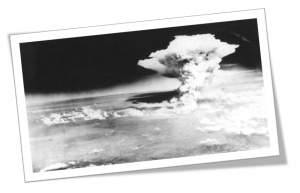
ATOMIC MUSHROOM OVER JAPAN IN 1945.
Two dates that represent an indelible warning for humanity. On August 6 and 9, 1945, two atomic bombs were dropped on Japan. Moments after these explosions, the cities of Hiroshima and Nagasaki were invaded by frightening toxic clouds, and devastated by piles of victims and rubble.
These heart-rending scenes remain the tragic backdrop to the appeals made by Supreme Pontiffs in recent decades. Words and prayers that lead to one hoped-for horizon: that of nuclear disarmament.
Francis, of course, renewed this exhortation, adding his own voice to that of his predecessors. At the end of his apostolic trip to Japan in November 2019, on board the Tokyo-Rome flight, the Pope reaffirmed how "the use of nuclear weapons is immoral. "This must be included in the catechism of the Catholic Church; not only the use, but also the possession, because an accident or the folly of one leader, the folly of one can destroy humanity," he added.
The Holy Father also made an appeal for world disarmament during the general audience of January 20, 2021. Referring to the Treaty for the Prohibition of Nuclear Weapons, he explained that it is the "first legally binding international instrument that explicitly prohibits nuclear weapons.
Pius XII: only the cry of humanity will remain
The Second World War shows, before its epilogue, the tragic power that nuclear energy can achieve in the military field. The atomic bomb, as Pope Pius XII pointed out on February 8, 1948, is "the most terrible weapon that the human mind has conceived up to now". On December 24, 1955, in his Christmas message to the whole world, Pope Pacelli described with impressive precision "the spectacle that would be offered to the horrified eye" after the use of nuclear weapons: "Entire cities, even among the largest and richest in history and art, annihilated; a black blanket of death on the pulverized material, covering countless victims with burned, twisted, scattered limbs, while others groan in the agony of death.
John XXIII and the world on the brink of the abyss
On October 25, 1962, a few days after the opening of the Second Vatican Council, the world seemed to be on the brink of the Third World War. Moscow and Washington are about to use the atomic bomb. From the microphones of Vatican Radio, Pope John XXIII appealed to avoid conflict following the Cuban missile crisis: "With your hand on your conscience, let them hear the anguished cry that from all parts of the earth, from innocent children to the elderly, from individuals to communities, ascends to heaven: Peace! Peace!".
In the 1963 Encyclical Letter Pacem in Terris, Pope Roncalli recalled that "human beings live in the nightmare of a hurricane that can break at any moment with unimaginable force.
Paul VI: Nuclear power, the most fearsome threat
Encouraging, but not decisive, date than that of July 1, 1968. The Nuclear Non-Proliferation Treaty is approved. A few days earlier, on June 24, 1968, Paul VI reiterates the urgency of "putting an end to the nuclear arms race". "We know that the agreement, in the opinion of many, has many limitations in itself, which prevent some governments from giving it their unconditional support. But this, he acknowledges, remains an indispensable first step towards further steps in the field of disarmament.
John Paul II: a moral upheaval is necessary
The world and its fragile balance can be turned upside down, forever and in an instant, by atomic weapons. In 1980, Pope John Paul II, addressing UNESCO, recalled that "geopolitical reasons, global economic problems, terrible misunderstandings, wounded national pride, materialism and the decline of moral values have led our world to a situation of instability, to a fragile equilibrium". One year later, on February 25, 1981, the Pope Wojtyla observed that "our future depends on one factor: humanity must bring about a moral upheaval".
Benedict XVI: Peace is based on trust
The perspective of governments that measure their strength and security on atomic weapons is "fatal" and "spurious". On the contrary, it is the path to disarmament that the world must follow. Benedict XVI also emphasizes on various occasions that nuclear weapons condition the future of humanity. During the General Audience of May 5, 2010, he stressed that "the process towards concerted and safe nuclear disarmament is closely linked to full and prompt compliance with relevant international commitments. Indeed, peace is based on trust and respect for the obligations undertaken, and not only on the balance of forces".
Francis: the use and possession of atomic weapons is immoral
Following in the footsteps of his predecessors, Pope Francis also repeatedly points the way to disarmament. During his apostolic trip to Japan, on the occasion of his speech at the Peace Memorial in Hiroshima on November 24, 2019, he stressed that "the use of atomic energy for war purposes is immoral, just as the possession of atomic weapons is immoral. He goes on to ask: "How can we talk about peace while building new and formidable weapons of war? A question which, even today, despite the tragic days in Hiroshima and Nagasaki, continues to question man and his conscience. As tragic as the image taken from a 1945 photograph that François had reproduced on a map: a 10-year-old boy carrying on his shoulders the corpse of his little brother killed after the explosion of the atomic bomb in Nagasaki.
Your contribution to a great mission: support us to bring the word of the Pope to every home.
